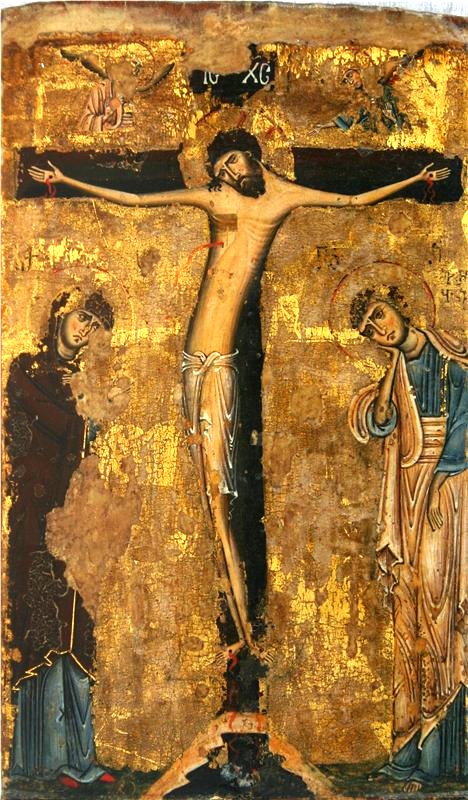Lenten Sunday5 A (10 Apr 2011)
Ez 37. 12-14; Ps ; Rm 8. 8-11; Jn 11. 1-45
Homily of Fr. Paul Panaretos, S.J.
New Purpose
For any of us with a fear of closed spaces Jesus command to Untie [Lazarus] and let him go is more than welcome. Not merely a release from burial bands, but a freedom to live again and in a new way. Of that I am convinced because of my father.
 He had had a heart attack, which lasted a while, and coronary bypass surgery saved him. Some days later a friend of my father visited him. I arrived shortly before his doctor stepped in that day. My father introduced the doctor to his friend, “Meet the man who saved my life.”
He had had a heart attack, which lasted a while, and coronary bypass surgery saved him. Some days later a friend of my father visited him. I arrived shortly before his doctor stepped in that day. My father introduced the doctor to his friend, “Meet the man who saved my life.”
The freedom Lazarus experienced surely was no longer bound by physical death. Like my father Lazarus may well have been freed from his sickness which weakened him to the point of death. Like my father and countless others, Lazarus enjoyed a freedom that lay deeper than that. In religious language this depth goes by “interior.” It is a freedom so real that it cannot be confined, yet we do not automatically live it.
This freedom is a gift both received and shared. It registers in many ways. The earliest Christians reminded us that it registered as an experience of power. They named it as authority, boldness, energy and power1 for personal transformation as well as announcing the good news of Messiah Jesus’ death and resurrection.
St. Paul reminded us it was no impersonal force but the living power of God: Holy Spirit. St. Paul easily equated Spirit of God with Spirit of Christ. More, and this is easy for us to miss because Paul’s language was not ours: flesh does not mean “body”; and spirit does not mean “mind.” Things of the flesh are not necessarily physical but the ways we measure reality as if we were the center of the universe and not God. We measure this way by impulse, which indicates our freedom is compromised. As St. Paul expressed it from experience, What I do, I do not understand. For I do not do what I want, but I do what I hate.2
Using stronger language St. Paul said our impulse makes us oppose God: the concern of the flesh is hostility toward God.3 Again my patron saint needs to be clarified: he spoke not psychological language but religious language.  The point is not hostile feelings toward God, but our pattern of choosing which shuts out God and God at work in our world. On our own we are helpless, but we are not helpless because God’s gift is at once personal and intimate: the Spirit of the one who raised Jesus from the dead dwells in you.
The point is not hostile feelings toward God, but our pattern of choosing which shuts out God and God at work in our world. On our own we are helpless, but we are not helpless because God’s gift is at once personal and intimate: the Spirit of the one who raised Jesus from the dead dwells in you.
In the portion of his letter we heard, St. Paul turned from the unfortunate condition of our marred freedom not to mention it again. Rather, he extolled the gift of Holy Spirit dwelling in us. The Second Vatican Council taught, in language we understand easily, if you and I are to “to cling to what is good [we cannot] achieve [our] own integrity without great efforts and the help of God's grace.”4 God’s grace is God’s life, Holy Spirit given us by our Messiah and Lord, Jesus.
Lent helps us reclaim our original freedom by helping us to notice clearly our impulses, our obsessions and our fears. Our Lenten practices help us move through impulses, obsessions and fears and rise above them. We become better able to make choices to live from our faith not our fear. Faith’s freedom empowers us to reshape our lives after the cross and resurrection of Messiah Jesus and to have his attitude in our daily lives. The closer we remain to the cross and resurrection of Jesus, the more free we become to affect our world. Our Catholic paradox is a rewarding challenge.
In your daily 15 minutes with Jesus this week, compose yourself in our triune God. Ask Lazarus to present you to Jesus, who gave him a new lease on life and new purpose to live it. Speak with Jesus: praise him for dying and rising for you; ask Jesus for the grace to rise above what keeps you from proclaiming his dying and rising by how you live. Close saying slowly the Lord’s Prayer. His words, lead us not into temptation on our lips, are not restricted to wrong actions. They beg the grace to conform ourselves more and more to the One who saved us by his dying and rising.
____________
- Numerous are the appearances of these words throughout the NT as a concordance demonstrates.
- Romans 7.15.
- Romans 8.7, the verse immediately before the verse which began today’s second reading.
- Church in the Modern World, 37, of the Second Vatican Council.
No comments:
Post a Comment